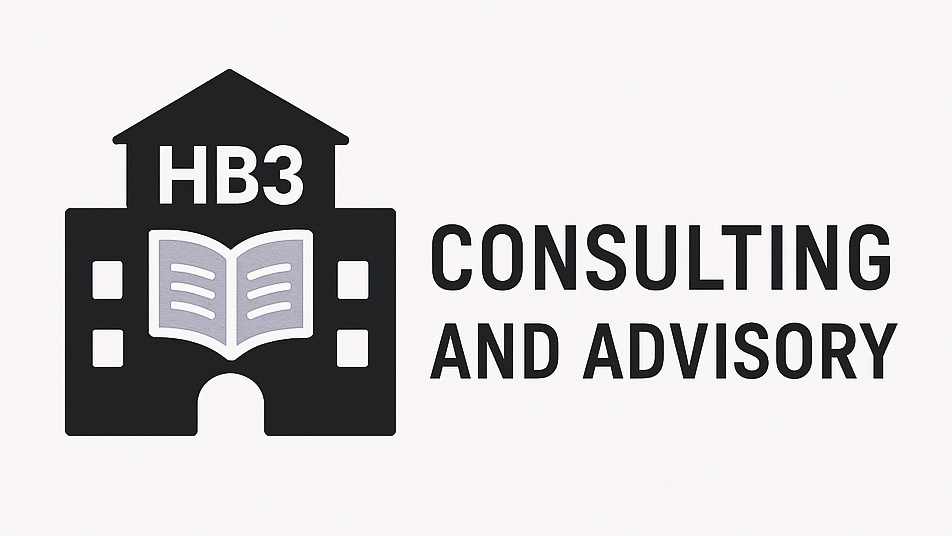The Map and the Journey: Designing Curriculum and Assessment with Purpose
In the world of alternative education – whether that means microschools, charter schools, or homeschool cooperatives - there’s a shared impulse to create a learning environment where students can explore freely. Learning is designed to feel organic and student-driven, with the intention of building upon their interests and encouraging them to learn more. But as any skilled traveler knows, even the most exciting adventure benefits from a good map.
In education, curriculum is the map, the intentional planning that helps ensure students are not just wandering aimlessly. And assessment is the journal, the record of what’s been discovered along the way, with notes, reflections, and accomplishments.
At HB3 Consulting and Advisory, I help school founders and educators shape both parts of that process: designing high-quality curriculum that invites deep exploration and building authentic assessments that reflect meaningful learning.
Curriculum: More Than Just Content
My approach to curriculum design is rooted in creativity, structure, and real-world connection. I have long held a deep interest in building interdisciplinary projects that integrate core content areas, blending English language arts, science, social studies, and the arts into cohesive, thematic units. This not only deepens understanding for students but shows them how knowledge connects across disciplines.
I believe that the best classroom isn't confined to four walls. Field trips to local museums, parks, and cultural institutions aren’t just extras; they’re essential. They inspire curiosity, invite new perspectives, and give students opportunities to apply what they've learned in dynamic, tangible settings. And for teachers, they provide an opportunity to draw new connections and provide students with memorable experiences. As a teacher, my core philosophy was, “Trick students into learning,” and field trips provide ideal settings for this to happen on a regular basis.
Even exploration benefits from scaffolding. I help those designing alternative school models and member of cultural institutions create curricular plans that support student agency while also ensuring that core knowledge is introduced, revisited, and mastered.
Assessment: A Window, Not a Gate
Assessment should never feel like a trick or a trap. Instead, it should serve as a clear window into what a student knows, understands, and can do.
I work with educators to build formative assessments that provide real-time insights, whether through questioning, observation, or quick knowledge checks that inform next steps. I also support the design of summative assessments that are both rigorous and flexible, aligned with external requirements but rooted in authentic learning. Too often assessment, testing, and grading are lumped into a lifeless process that drains all of the enjoyment out of teaching and learning. This doesn’t need to be the case; assessment is simply checking for understanding and it is an inseparable part of good teaching. If you dislike assessment, then there’s an excellent chance you could be doing it better. And easier.
One particular area of expertise is portfolio development, a powerful tool that allows students to showcase their growth over time. Paired with well-crafted rubrics, portfolios provide a shared language between students, teachers, and outside evaluators. Rubrics make expectations transparent and emphasize what really matters, not just what’s easiest to score.
Planning for Freedom
There’s a misconception that student-centered models mean teachers “let kids do whatever they want.” But the truth is that the best open-ended learning experiences emerge from careful, thoughtful planning. Just like in a museum exhibit, where every object is placed with intention, every learning opportunity should be shaped with purpose.
I help learning communities strike this balance: giving students space to explore, while ensuring they’re supported by a strong foundation of intentional curriculum and thoughtful assessment.
If you're a microschool founder, charter leader, or homeschool collective shaping your vision, HB3 Consulting and Advisory can help bring clarity to your planning and turn your big ideas into a living, learning reality. And if you’re a cultural institution (or ideally a collaborative of local cultural institutions) who wants to create a shared curriculum than can be used by students in alternative schooling models. then now is the time to get to work.
Let’s design something extraordinary, together.
